|
|
|
Sort Order |
|
|
|
Items / Page
|
|
|
|
|
|
|
| Srl | Item |
| 1 |
ID:
185591
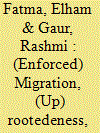

|
|
|
|
|
| Summary/Abstract |
This article argues that expressions of postmemory—a form of relationship that a generation has with its antecedants, as proposed by Marianne Hirsch—are writ large in the descendants of the Kashmiri Pandits who fled from the Kashmir Valley in the 1990s and before then. Through a close reading of two novels by Kashmiri writers, Siddhartha Gigoo’s The Garden of Solitude and Rajat Mitra’s The Infidel Next Door, this article analyses the prevalence of guilt, curiosity and the yearning to (re)connect with a lost home that is evident amongst subsequent generations in relation to their parents’ and grandparents’ forced migration from Kashmir. We demonstrate that the idea of postmemory provides a useful framework for understanding the feelings of simultaneous attachment to and generational distance from the past.
|
|
|
|
|
|
|
|
|
|
|
|
|
|
|
|
| 2 |
ID:
185595
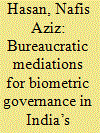

|
|
|
|
|
| Summary/Abstract |
Interrogating Aadhaar, India’s biometric ID project for its billion-plus residents, in the small north-eastern state of Tripura, where it first achieved high levels of acceptance, reveals that ‘success’ at enrolments into the database was dependent on the subversion of its celebrated biometric potentials by a local mediating bureaucracy. By limiting enrolments to previously documented subjects and enrolling Aadhaar into an ongoing regional situation of strife and reconciliation, the work of the bureaucracy highlights the contextual, territorial conditions of securitisation within which a biometric database takes shape. This paper aims to challenge claims about Aadhaar as an emblematic case of biometric governance ushering in a ‘new’ state, instead suggesting linkages with existing forms of state practices and ongoing state projects.
|
|
|
|
|
|
|
|
|
|
|
|
|
|
|
|
| 3 |
ID:
185589


|
|
|
|
|
| Summary/Abstract |
This article argues that in Pakistan, intra-Islamic differences and the contested field of Islamic identity politics affected and moulded the country’s integrated and overlapping religious identities into distinct and disparate categories at the micro level. The article discusses the process of formation of the jamaat of the Sufi-inspired silsila, the Naqshbandia Awaisia, by Major Ghulam Muhammad among the military and an urban middle-class constituency. It shows how the jamaat conceptualised and imbued Sufism with an exclusivist approach, positioning Sufism and Sharia within an Islamic discourse that categorically rejected the religion’s ritual and devotional aspects. This embroiled these mutually constitutive and intersecting dimensions, Sharia, esoteric Sufi doctrine and the devotional and ritual aspects in an ambivalent relationship. The exclusion of the devotional and ritual aspects became a boundary-setting label of difference between the ‘proper’ Muslim and the ‘other’ along a matrix of knowledge and power.
|
|
|
|
|
|
|
|
|
|
|
|
|
|
|
|
| 4 |
ID:
185596
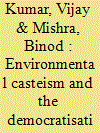

|
|
|
|
|
| Summary/Abstract |
Mainstream Indian environmental movements and academic environmental histories, embedded in casteism, have overlooked the inequitable distribution of natural resources, leaving the ecological crisis facing Dalits unaddressed in both scholarly discourse and public arenas. This study aims to scrutinise the casteisation of natural resources and Dalits’ socio-ecological precariousness in two Dalit self-narratives—Baby Kamble’s The Prisons We Broke and Bama’s Karukku. We seek to deconstruct and transform narratives about environmentalism in India, which can best proceed through the active and progressive intervention of the insecure social classes (mainly Dalits). In doing so, the study will throw light on egalitarian eco-consciousness in Dalit narratives, and highlight Dalit voices as fundamental to shaping post-colonial ecocriticism.
|
|
|
|
|
|
|
|
|
|
|
|
|
|
|
|
| 5 |
ID:
185593
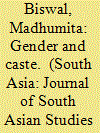

|
|
|
|
|
| Summary/Abstract |
Drawing from fieldwork on frontline health workers in villages in the state of Odisha, India, this paper critically interrogates the complex ways in which frontline health workers negotiate between their intersecting gender and caste identities and their roles as modern professionals at the village level. It argues that the embodied identities of these frontline health workers become crucial in shaping other villagers’ views on their labour. Frontline health workers from caste Hindu communities often claim that the spatial demarcation between public and private becomes a way out in resolving the conflicting demands posed by their professional roles and kinship obligations regarding caste practices. However, contrary to this claim, this article argues that such a neat demarcation of space remains unsettled in practice.
|
|
|
|
|
|
|
|
|
|
|
|
|
|
|
|
| 6 |
ID:
185586
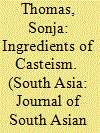

|
|
|
|
|
| Summary/Abstract |
This article examines casteism and the food practices of dominant-caste Syrian Christians during Holy Week in Kerala, India. Kerala is often deemed to be educated, progressive and secular. However, education and secular practices have not eradicated casteism. Looking at three specific breads made by Syrian Christians during Holy Week, I trace the difference between Syrian Christian food-giving to Dalit Bahujan workers, and food-sharing between Syrian Christians and dominant-caste Hindus. Food, I argue, gives us a lens to understand how casteism continues to function despite narratives of Kerala’s secular and progressive exceptionalism.
|
|
|
|
|
|
|
|
|
|
|
|
|
|
|
|
| 7 |
ID:
185590


|
|
|
|
|
| Summary/Abstract |
This article analyses how the demolition of the Babri Masjid by Hindu nationalists and the communal violence in its aftermath (1992–93) is remembered in a predominantly Muslim slum neighbourhood in Mumbai. By drawing on ethnographic fieldwork, it considers how a traumatic event is given meaning through fragmented memories inscribed in the urban space. A nuanced analysis of the recollections of the city’s Muslim poor, who faced the main brunt of the violence, suggests that the spatial context of the Muslim neighbourhoods provide a safe social backdrop for the expression of an otherwise suppressed memory that has been pushed by the official narratives of the past into marginality, leading to the creation of an alternative sociality that addresses community concerns to break the hold of the past and imagine a future of peaceful cohabitation.
|
|
|
|
|
|
|
|
|
|
|
|
|
|
|
|
| 8 |
ID:
185594
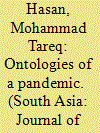

|
|
|
|
|
| Summary/Abstract |
Since the outbreak of COVID-19 in Bangladesh, the government has struggled to enforce regulations to curb spread of the disease. People continued to travel to their desh (home village) not caring about the prescribed health guidelines even after national lockdown was announced. As per many people’s perspectives, they—the pious/Bangladeshis—were immune to COVID-19. Nevertheless, novel forms of stigmatisation emerged. In this article, I seek to illuminate why Bangladeshis violated the government-prescribed health guidelines and put themselves and their families at risk. I contend that, though it can be argued that not many people were aware of the seriousness of the coronavirus, the pandemic has exposed ontological potentialities and differences among the people of Bangladesh.
|
|
|
|
|
|
|
|
|
|
|
|
|
|
|
|
| 9 |
ID:
185592
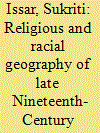

|
|
|
|
|
| Summary/Abstract |
The spatial separation of European colonialists and the local population was long seen as the defining feature of colonial cities. In recent years, the literature has moved toward a more ambivalent and contingent view of this spatial separation. This paper attempts to look beyond imagining the colonial city in terms of stark dualities or revisionist ambivalences, addressing both religious and racial separation. The paper analyses the street-level religious and racial geography of late nineteenth-century Bombay, using data from the 1881 Census. Results suggest moderate to high levels of racial and religious segregation in nineteenth-century Bombay at the street level, varying across groups, coupled with the existence of enclaves, and expressions of preference for segregation in diverse domains. The paper concludes that religion and race were meaningful social categories inscribed in urban space.
|
|
|
|
|
|
|
|
|
|
|
|
|
|
|
|
| 10 |
ID:
185588


|
|
|
|
|
| Summary/Abstract |
This article examines jāt (‘caste, ethnicity’) through the lens of signed conversations in contemporary eastern Nepal, where both intimacy and inequality characterise inter-jāt relations. Local deaf and hearing people refer in sign to a person’s jāt with an action taken as emblematic of that jāt, such as drinking alcohol. Signers use the same phrases to discuss persons’ actions, which may or may not conform to typifications. Analysing signed discourse reveals that people negotiate a shifting social landscape through an approach to bodies as ontologically dual, belonging both to selves with idiosyncratic habits and to jāt groups with prescribed and proscribed practices.
|
|
|
|
|
|
|
|
|
|
|
|
|
|
|
|
| 11 |
ID:
185587
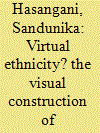

|
|
|
|
|
| Summary/Abstract |
Developed ostensibly to enhance social interaction, social media has become a powerful tool of pedagogy, cognition and politics. Visual content is particularly powerful since it is processed quicker than text, generating immediate emotional responses and a higher degree of memorability. This study looks at the way ‘Sinhalaness’ has been visually portrayed on social media by Sinhalese users by analysing a body of visual artefacts publicly posted on Facebook between 2011 and 2018. A content analysis of these suggests that in the immediate period after the civil war (1983–2009), online Sinhalaness has become largely defined by an increased religious, specifically Buddhist, consciousness, supplemented by war memories. This contrasts with the largely linguistic basis of Sinhala identity articulated in the pre-2009 period.
|
|
|
|
|
|
|
|
|
|
|
|
|
|
|
|
|
|
|
|
|